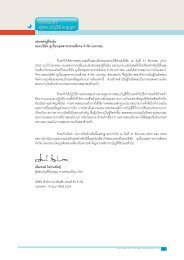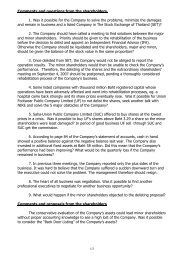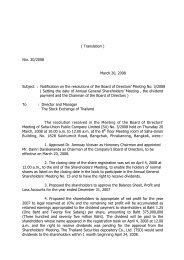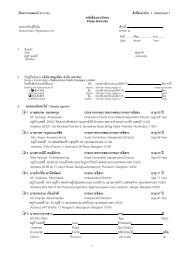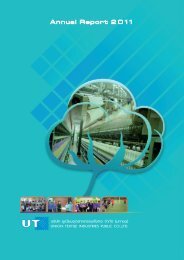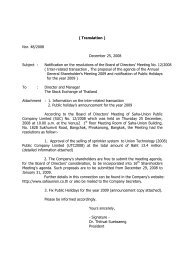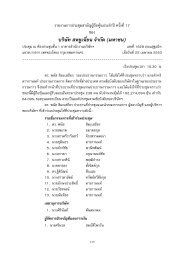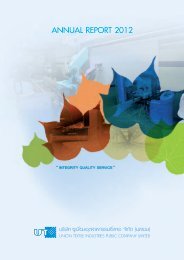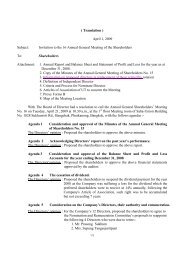INTEGRITY QUALITY SERVICE - Saha-Union Co., Ltd
INTEGRITY QUALITY SERVICE - Saha-Union Co., Ltd
INTEGRITY QUALITY SERVICE - Saha-Union Co., Ltd
Create successful ePaper yourself
Turn your PDF publications into a flip-book with our unique Google optimized e-Paper software.
SAHA-UNION<br />
59<br />
RISK FACTORS<br />
The <strong>Co</strong>mpany has a sub-committee for risk management<br />
who are responsible for assessing risks, setting up<br />
risk management policies for the <strong>Co</strong>mpany and its<br />
affiliated companies and evaluate the results to the<br />
Board of Directors of each company as well as inform<br />
those companies as schedule. Since the economic,<br />
political and social situations are changing, there must<br />
be a revision of risk factors, an evaluation of intensity<br />
of the possible effect, and a revision of management<br />
procedure so as to control the risks within the level<br />
accepted by the organization or to eleminate those<br />
risks. In consideration of risk factors, both internal<br />
and external, they are categorized into the business<br />
risk, the administrative risk, the financial risk, and<br />
risk from external factors that significantly affect the<br />
<strong>Co</strong>mpany. Also, the measures and policies on the risk<br />
management have been transmitted to the Executive<br />
and implemented levels of the company as well as the<br />
companies in the Group to let them know the clear<br />
objectives and work towards the same direction to<br />
achieve policy’s goals.<br />
Incidents posting risks that significantly affect the<br />
<strong>Co</strong>mpany are:<br />
1. BUSINESS RISK is the risk concerning the returns<br />
on investment that does not meet the target.<br />
Nature of the <strong>Co</strong>mpany’s core business is investment,<br />
including domestic investment and foreign investment.<br />
Returns on investment come in terms of dividends, which<br />
can cause a risk of returns of investment missing the<br />
target, reducing the profit. The <strong>Co</strong>mpany evaluated that<br />
the likelihood of this risk to happen is moderate, due to the<br />
diversification of investment. The measures to manage this<br />
risk are a closely follow-up the performance figures and<br />
returns of investment and assess status in the future of<br />
the investment business for finding solutions in advance.<br />
The happening in 2011 was that the investment in energy<br />
business in Yunnan Energy Qujing-<strong>Union</strong> Power <strong>Co</strong>., <strong>Ltd</strong>.<br />
in China had a continuous deficit operating result recently,<br />
which could not be improved. Therefore, the <strong>Co</strong>mpany’s<br />
Board of Directors had a resolution to cease the operation<br />
in order to reduce loss from the investment. It is currently<br />
under proceed of related matters.<br />
Moreover, business risk in terms of dissatisfactory returns<br />
of investment may happen again in the future by another<br />
reason, a change in accounting standards generally<br />
accepted in Thailand to use the international standard to<br />
of IFRIC4 concerning the lease agreement evaluation and<br />
the standard interpretation of financial report No. 12 (IFRIC<br />
12) on service concession agreement. If the interpretation<br />
results conclude that the power plant business is deemed<br />
as a property lease agreement or service concession<br />
agreement, it will affect the operating performance of<br />
Ratchaburi Power <strong>Co</strong>mpany Limited, under the company’s<br />
investment, causing it to change the accounting practice,<br />
resulting in a decrease in the early years’ net profit, which<br />
may cause the <strong>Co</strong>mpany to receive less dividends.<br />
2. OPERATIONAL RISK has the matters as follows:<br />
2.1 Risks of damage and mismanagement of investment<br />
The <strong>Co</strong>mpany’s main business is in the form of<br />
investment, meaning that if the corporate in which the<br />
<strong>Co</strong>mpany invested face difficulty in their administration,<br />
the <strong>Co</strong>mpany can be affected directly. The <strong>Co</strong>mpany<br />
evaluated that the likelihood that this risk could happen<br />
is moderate because the <strong>Co</strong>mpany has diversified<br />
its investment to many businesses. It also has the<br />
supporting measure by evaluating the risk of the<br />
investing companies, setting up personal internal<br />
control for those companies, giving knowledge in the<br />
matters concerned. The <strong>Co</strong>mpany also has a follow-up<br />
system for policy implementation and an internal control<br />
system for each type of investing business.<br />
2.2 Risks from relying on production orders from few major<br />
customers<br />
Some of the <strong>Co</strong>mpany’s subsidiaries are joint<br />
ventures, whose co-investors are foreigners operating<br />
their business and producing almost all products<br />
overseas. The effect of relying on production orders<br />
from few major customers is massive when the<br />
customers change or reduce their orders, or move<br />
their production base to a different country. However,<br />
the likelihood is quite slim since those joint venture<br />
investors are accounted to only half of the investment,<br />
and the benefits must be compromised among these<br />
investors for a return of investment. The <strong>Co</strong>mpany<br />
has a measure to maintain the good relationship with<br />
these joint venture and to produce the products up to<br />
the requirements of the customers.



